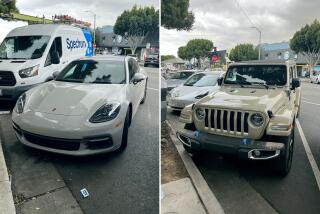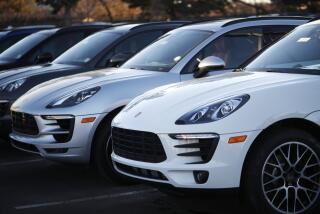Porsche’s Upcoming SUV Has the Purists Sputtering
- Share via
To die-hard Porsche owners like Robert Gordon, the line has been crossed. Snowballs are rolling uphill in Hades. Porsche, shudder, is going to build an SUV.
“It’s blasphemy,” said Gordon, a photographer in Woodland Hills who owns a 1987 Porsche 911 Turbo. “I’m not hot on the idea at all. I’ve lived with Porsches all my life, and the marque has always been Porsche sports cars. To bring out an SUV doesn’t sit well with me.”
But that’s just what’s happening.
Venerable Porsche, whose name is synonymous with German automotive high performance and craftsmanship, is building a factory in Leipzig, Germany, for the Cayenne, a sport-utility vehicle that it plans to put on sale sometime next year.
“Porsche” and “SUV” are two words that enthusiasts of the sports car maker never thought they would hear in the same sentence.
Is Porsche going mainstream? Is it turning its back on its exclusivity and its racing heritage? Will it become the latest status symbol for soccer moms?
Hardly, said Fred Schwab, chief executive of Porsche Cars North America.
“The car will be king of the highway, with a great deal of competence off-road,” Schwab said. He would not give performance data but said he is confident the turbocharged version will blow away the 342-horsepower Mercedes-Benz ML55 AMG, which claims to be the fastest SUV on the planet.
The sticker price? Porsche isn’t saying yet, but it is expected to start at less than the company’s standard-bearer, the $66,000 911.
Most important for Porsche, the Cayenne “will allow us never to revisit 1993,” said Schwab, referring to that bleak year when Porsche sales in the United States plummeted to one-eighth their level of 1986.
Bit of Insurance for the Company
The business case for the Cayenne is compelling. With only two models currently sold in the U.S.--the 911 in various forms and the Boxster roadster--Porsche is at the mercy of a fickle economy. In good times, people buy Porsches; in tough times, they may not.
“Let’s face it,” Schwab said, “we manufacture the ultimate deferrable purchase.”
In effect, the Cayenne will be a hedge against economic downturns that put a squeeze on exotic sports car sales.
“What will become of our heritage if we . . . build only two products in a narrow market niche that is subject to the financial fluctuations in our economy?” Schwab said. “We would risk our own existence.
“Building and selling the Cayenne provides us with the financial strength and size to weather the financial storms that come,” he said.
That means remaining independent so as to preserve the flavor and essence of the Porsche heritage, Schwab said.
More than half of Porsche owners already own an SUV, so Schwab said Porsche should build one to keep those customers in the brand, rather than have them buy BMWs, Mercedes or Land Rovers.
He shrugged off criticism about Porsche being late to the SUV game, saying, “Should Toyota have not launched Lexus just because BMW and Mercedes were there first?”
Building the Cayenne is a smart move, said auto industry analyst James Wright of Lehman Bros. in London. Porsche 911 owners, for instance, tend to be men in their 40s or 50s who are likely to have children still at home. Fitting them into a snug sports car is a problem.
“It’s a classic diversification strategy,” Wright said. “Porsche has a disproportionately large share of a very small market. Now they’ll have a small part at the top of a very large market as well.”
Still, it’s out of character, said Greg Salchow, who follows the auto industry for the Detroit office of investment bank Raymond James & Co.
“To me, Porsche is a sports car, period,” said Salchow, who has been a Porsche enthusiast since he was 8 years old and owns a honey-colored ’87 911 Targa.
Salchow said that when someone asked him about five years ago--well before there was any hint of the Cayenne--when he would know that the SUV boom was over, he answered, “When Porsche builds one.”
Sports Cars From the Beginning
The legendary Ferdinand Porsche began building sports cars in 1948, starting with the 35-horsepower Porsche 356. The 1300, 1500 and 550 Spyder followed in the 1950s.
The 911, the most enduring of the Porsches, was introduced in 1964.
The entry-level 914 was introduced in 1970, replaced by the 924 in 1975. The high-end, 240-horsepower 928 came in 1978, and the less-expensive 944 in 1982. Porsche fans lust after the all-wheel-drive 959, never sold in the U.S. Back at the low end, the 968 appeared in 1991.
Sales began to plummet in the late 1980s because of a weakening U.S. dollar. That made Porsches much more expensive in this country. At the same time, the company was hurt by soaring production costs and an aging product lineup.
Sales in North America skidded from a record 30,471 vehicles in 1986 to a mere 3,713 in 1993.
North American sales, which include a small number of cars sold in Canada, began to recover after Chief Executive Wendelin Wiedeking adopted leaner Japanese production techniques, allowing Porsche to reduce the price of the 911 and introduce the Boxster roadster in 1996 at a relatively inexpensive $40,000.
The Boxster quickly fired up Porsche sales and led the way to 23,698 units sold in North America last year, its third-best year in this market.
Porsche expects North American sales to be double that level by 2003, mainly on anticipated sales of the high-margin Cayenne.
But tiny Porsche cannot go it alone. In order to achieve production efficiencies, it is developing the Cayenne jointly with Volkswagen.
The Cayenne and its VW cousin, tentatively called the Colorado, will share a chassis but little else. The Cayenne will have a Porsche engine and transmission, suspension and brakes.
In fact, Porsche is in charge of most of the VW version’s design, partly to ensure that the two vehicles are very different in looks as well as performance.
Wright said the cooperation with Volkswagen means that Porsche will be able to break even on the Cayenne after selling just 5,000 units, quite an accomplishment in the auto business.
It’s not the first time Porsche has cooperated with VW, whose chairman, Ferdinand Piech, happens to be the grandson of Ferdinand Porsche and who sits on Porsche’s supervisory board.
One model of the Porsche 914 in the 1970s had a midship-mounted 1.7-liter Volkswagen engine. Its replacement, the 924, had a front-mounted four-cylinder Audi engine, and the entire car was built by Audi, VW’s luxury division.
No official prototypes of the Cayenne have been shown. But Schwab said it is likely to be built in six-cylinder, eight-cylinder and twin-turbo versions.
Perhaps to tantalize true believers put off by the Cayenne, Porsche also has unveiled the Carrera GT, a sleek, ultra-high-performance sports car with a V-10 engine blasting out 558 horsepower.
With a top speed of more than 200 mph, it will have an equally turbocharged price, $350,000, if Porsche decides to put it into production as expected.
But Porsche is banking on the Cayenne to lead the way to new record sales. And despite the early hostility from Porsche purists, the Cayenne may still be embraced.
Even Gordon of Woodland Hills, who sees the SUV as sacrilege, said his Porsche club won’t turn its back on Cayenne owners.
“We’ll still welcome them,” he said, although he admitted that the idea will take some getting used to.
He recalled that when the VW-powered Porsche 914 first appeared, “There was an upheaval. Now it’s sought after. It’s a collectible.
“Maybe it will be the same thing with the Cayenne.”
(BEGIN TEXT OF INFOBOX / INFOGRAPHIC)
Porsche’s Rebound
Although one of the ultimate icons of success, Porsche has traveled a bumpy road in the U.S. It’s sales, earnings and stock price plunged in the late 1980s and early ‘90s before turning around, thanks to more popular models and cost-efficient production.
Porsche vehicle sales in U.S. 2000: 23,698 *
Note: 1995-2000 figures include Canadian sales, which amount to less than 10% of total.
Source: Porsche Cars North America





